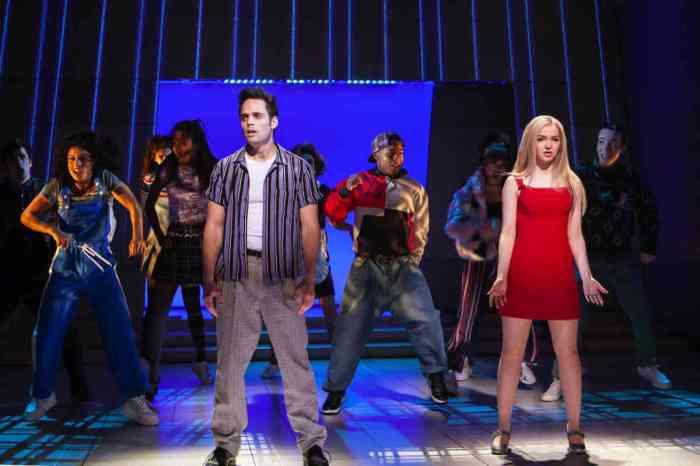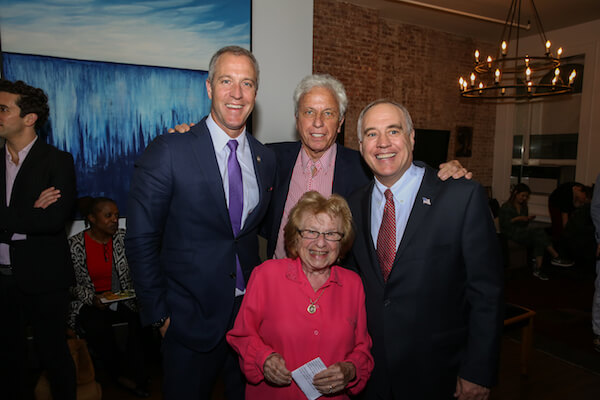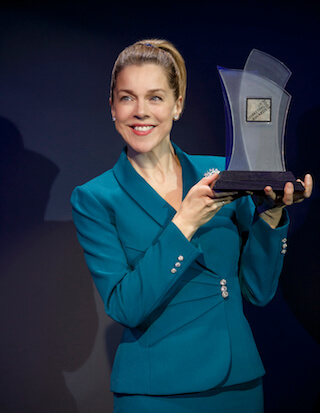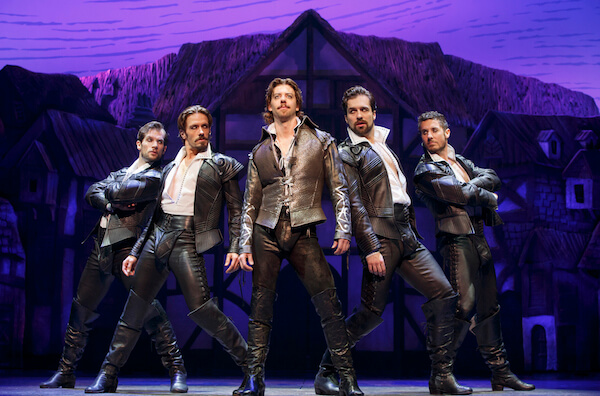Vanessa Aspillaga, Jamie Brewer, Debra Monk, and Mark Blum in Lindsey Ferrentino’s “Amy and the Orphans,” at the Laura Pels through April 22. | JOAN MARCUS
Playwright Lindsey Ferrentino is passionate about promoting the inclusion of the intellectually disabled in broader society and has chosen the theater as her platform for advocacy. Unfortunately, her “Amy and the Orphans” is tepid and largely unfocused and does little to advance her cause. In fact, the play demeans the subject matter.
According to a program note, Ferrentino wanted to honor her own aunt who had Down Syndrome and was institutionalized from a young age. The playwright acknowledges that while she saw her aunt intermittently, she was never part of the family’s daily life. That shows in a play that, ultimately, is an outsider’s romanticized observation.
Maggie, Jacob, and the titular Amy are siblings whose widowed father has died. Though Amy is a ward of the state, her father was her primary contact to the bigger world. Maggie and Jacob, who are not close and have a testy relationship, arrive at the Long Island institution where Amy lives to take her to Montauk for Thanksgiving. Rather than exploring the emotions brought up by the change in their family structure, Maggie and Jacob banter in lame jokes about Jacob having braces on his teeth and Maggie’s obsession with organic foods — which comes off as distracting filler. When Amy joins them, it’s clear she has built a solid life for herself, a fulfilling one that she doesn’t want to give up.
A well-meaning play undermines itself; a Margaritaville to escape
When her siblings pressure Amy to live with one of them, she stands her ground and asserts her own right to her life and identity, but Ferrentino can’t pull off the set-up. Though Maggie and Jacob are venal and selfish in contrast to Amy’s maturity and groundedness, the brother and sister are paper tigers who undermine the playwright’s mission to validate Amy’s dignity The results are a false conflict and feeble dramaturgy.
Though a black comedy, Peter Nichol’s “A Day in the Death of Joe Egg” from 1967 deals more honestly with the conflicting emotions and the devastation that a child’s disability can visit on a family, providing believable if disturbing insight into what can be an awful reality.
As Jacob and Maggie, Mark Blum and Debra Monk do what they can with their underwritten, simplistic roles. Vanessa Aspillaga is Kathy, Amy’s social worker, who by law must accompany her on every outing. Aspillaga is most believable in her watchful, engaged care for Amy, though her character is insultingly cartoonish. Ferrentino turned to an actor with Down Syndrome to play Amy and Jamie Brewer does an excellent job, but given how feeble the play is it feels like Ferrentino is merely demonstrating how high functioning and capable Brewer is. The actress is quite convincing and heartbreaking as Amy retreats, when overwhelmed, into the repetition of movie lines as a coping mechanism.
In full disclosure, I come to this play with a very specific bias. My youngest sibling is severely intellectually disabled and has been institutionalized for years. My other siblings and I have been deeply involved in her care and more so since our parents died. Fortunately, my sister is healthy, thriving, and well cared for. Ferrentino’s play particularly rankles because it avoids any honest exploration of family dynamics, and her characters’ ignorance of even the most basic elements of care and legality surrounding individuals who are wards of a state is implausible. And using their ignorance as the basis for jokes is a distasteful, irresponsible, and manipulative use of a serious condition to make a political statement. Ferrentino’s good intentions become in performance a shallow, emotional exploitation of her subject.
Well, who would have seen this coming? Two musicals in one season with a volatile volcano as a central plot point? In “SpongeBob SquarePants,” it’s just one more silly, cartoonish twist in an unabashedly ridiculous and delightfully off-the-rails show. In “Escape to Margaritaville,” however, it’s just one of the ludicrous elements in a generic rom-com, and a terrible one at that.
Lisa Howard, Alison Luff, Paul Alexander Nolan, and Eric Petersen in Greg Garcia and Mike O’Malley’s “Escape to Margaritaville,” based on the music of Jimmy Buffett, at the Marquis. | MATTHEW MURPHY
The inept book writers Greg Garcia and Mike O’Malley clearly have no idea how to create a theatrically viable story and instead have tossed off a derivative, soporific boy-meets-girl story that attempts to pass off vulgarity and sexual innuendo as comedy. A subplot with the secondary male and female leads that includes vicious body shaming ending in violence is remarkably tone deaf to current sensibilities.
Buffet’s tunes such as “Margaritaville” and “Cheeseburger in Paradise” are easy-listening ditties now mostly relegated to wedding and Bar Mitzvah DJ playlists. As with most jukebox musicals, the shoe-horning of the songs into the plot is contrived and awkward — probably the most annoying and amateurish element of Garcia and O’Malley’s book. The new songs are bland and unsophisticated and only superficially provide insight into the characters. Given that the characters themselves are tired stereotypes, this isn’t all that surprising.
The ethos of life in Margaritaville is that “work is a dirty word.” That certainly seems the case for Christopher Ashley’s disengaged, chaotic direction and the bland, lazy choreography from Kelly Devine. The choreography is particularly egregious, relying on conga lines, movements purloined from TV competition shows, and the most basic tap moves. It’s remarkable how boring it is.
What’s even more unfortunate is that there is some real talent in the company. Paul Alexander Nolan as Tully, the guy who escapes the rat race for the laid-back island life, is a dynamic presence with a great voice and lots of charm. Lisa Howard, as the ingénue’s best friend who is the target of the body shaming, brings her powerhouse voice and dazzling appeal to an essentially thankless part. Alison Luff, an earth scientist who comes to the island for soil samples and falls in love with Tully, is marvelous, though limited by the book. Supporting performances from Andre Ward, Eric Petersen, Rema Webb, and Don Sparks all showcase actors so much better than the material they’ve been given.
P.G. Wodehouse famously wrote that when a show is in trouble, you should “bring on the girls,” creating a distraction from whatever disaster was happening on stage. Sadly, in the case of “Escape to Margaritaville,” bringing on the girls (and cute chorus boys) does nothing to salvage this incoherent mess. Indeed, as the audience filed out humming, “Wasted again in Margaritaville…,” the only thing I could think of was my precious previous two-plus hours.
AMY AND THE ORPHANS | Laura Pels Theatre, 111 W. 46th St. | Through Apr. 22: Tue.-Sat. at 7:30 p.m.; Wed., Sat. at 2 p.m.; Sun. at 3 p.m. | $89 and roundabouttheatre.org or 212-719-1300 | Ninety mins., no intermission
ESCAPE TO MARGARITAVILLE | Marquis Theatre | 1535 Broadway at. W. 46th St. | Tue., Thu. at 7 p.m.; Wed., Fri.-Sat. at 8 p.m.; Wed., Sat 2 at p.m.; Sun. at 3 p.m. | $59-$249 at ticketmaster.com or 866-448-7849 | Two hrs., , 20 mins., with intermission




































